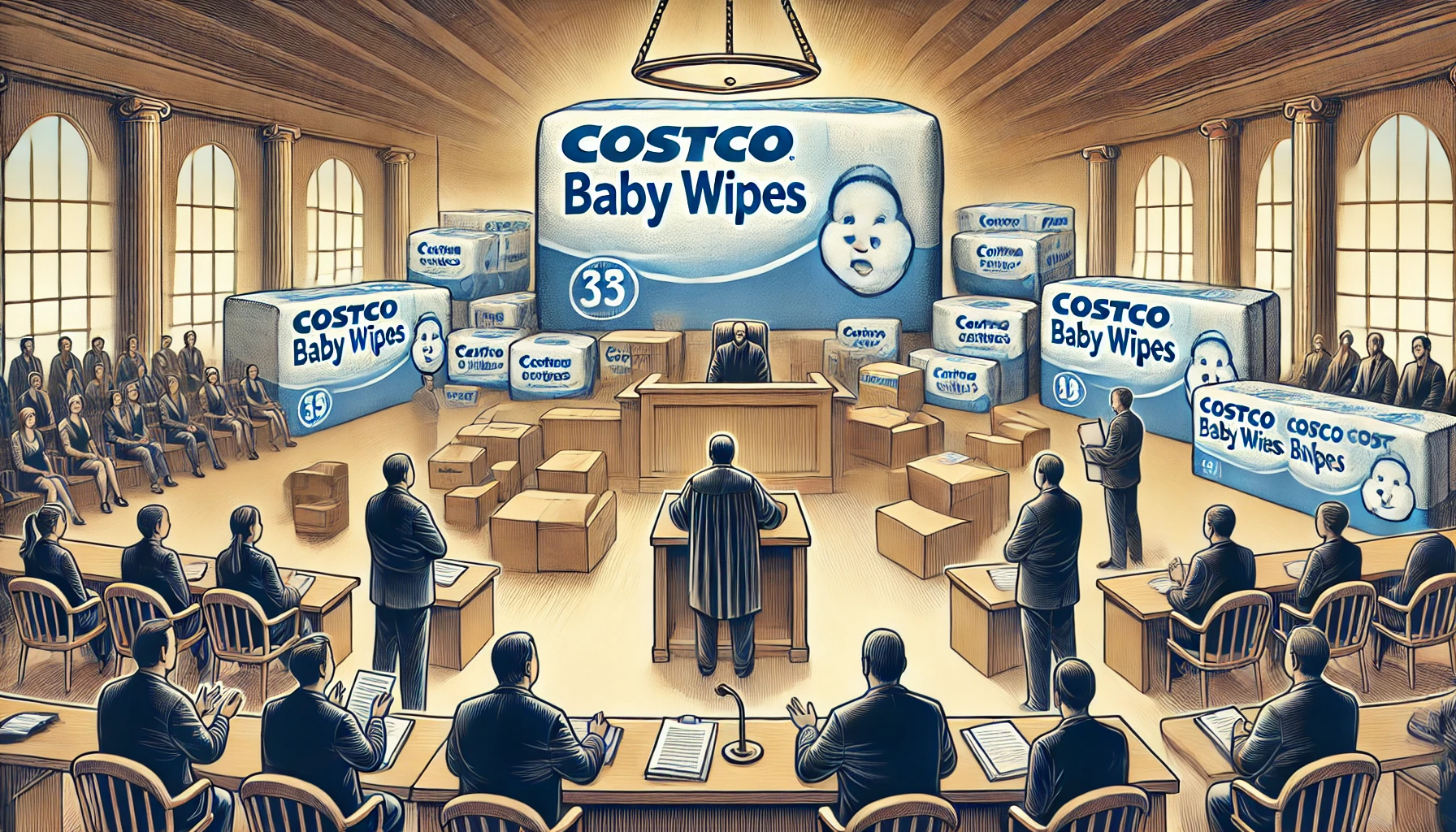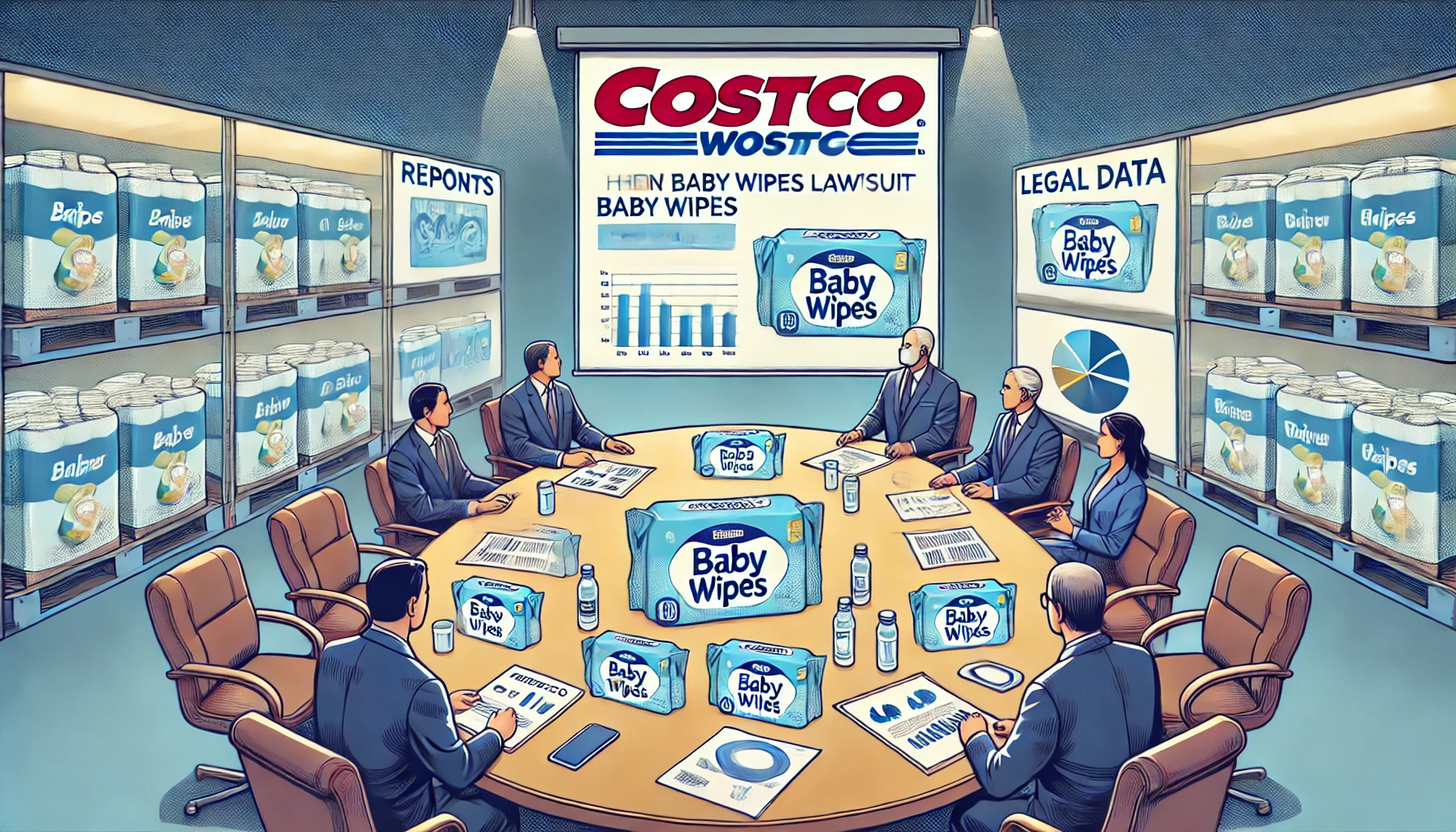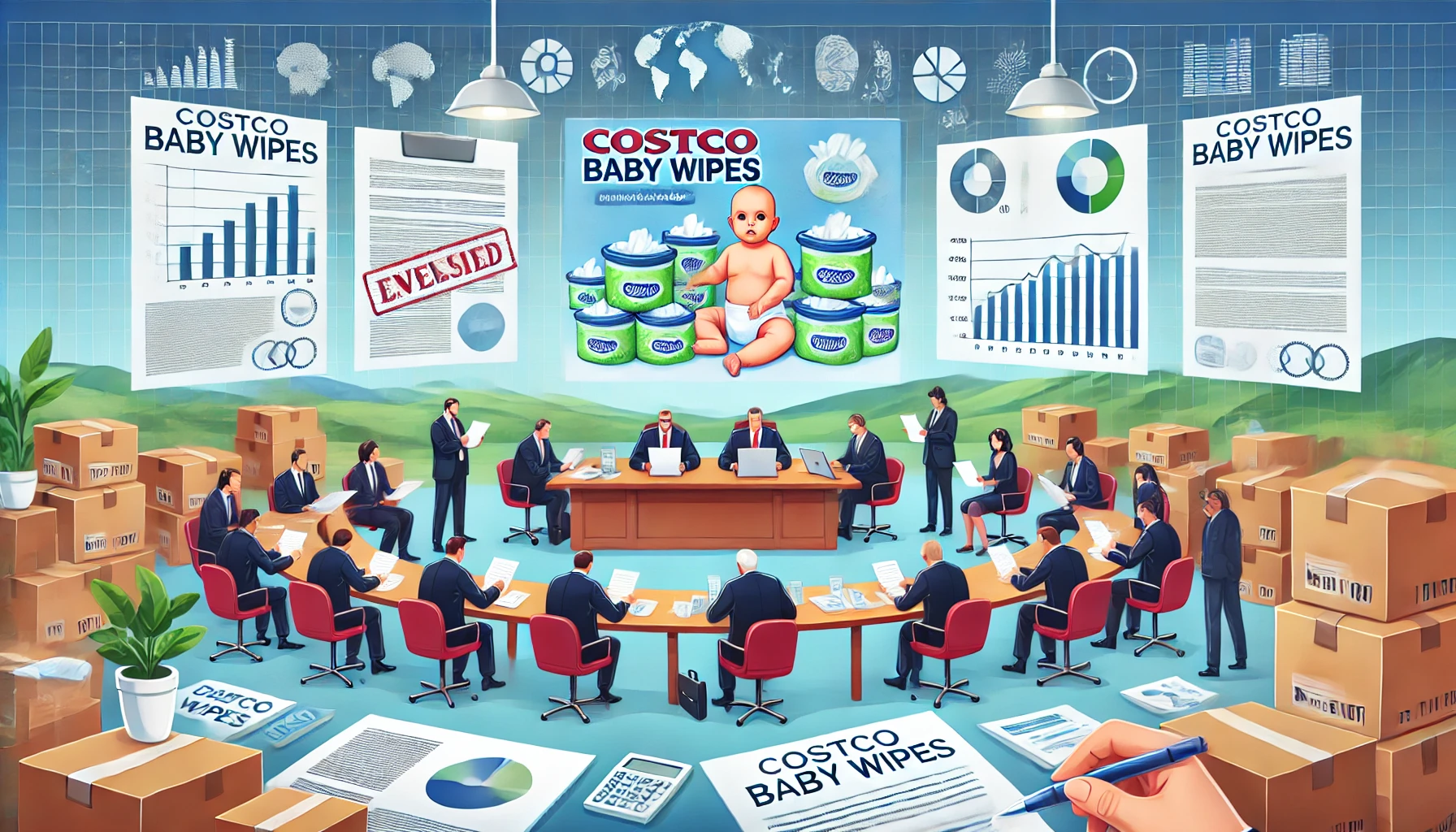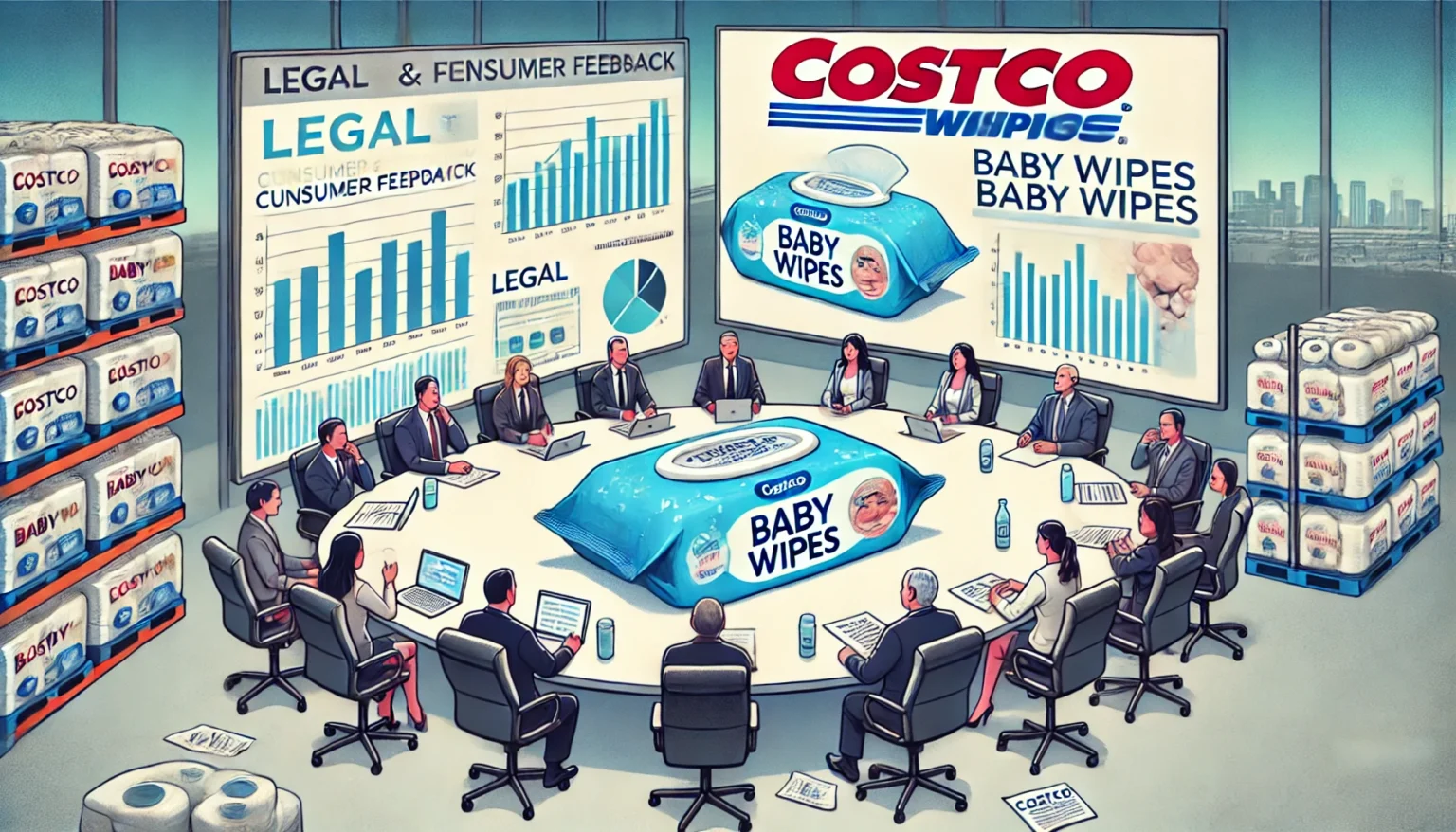Costco has recently found itself at the center of a legal dispute as Costco sued baby wipes claims have surfaced, drawing widespread attention. The case raises concerns about the quality and safety of the baby wipes sold under its brand, sparking reactions from consumers and industry experts alike.
The Costco sued baby wipes controversy revolves around allegations that the product may have contained harmful substances or misleading claims about its composition. This has led to heightened scrutiny over product transparency and customer trust.
As the Costco sued baby wipes lawsuit unfolds, it highlights the broader implications for retailers and manufacturers. Consumer safety and accountability remain critical in maintaining brand integrity in competitive markets.
Why Was Costco Sued Over Baby Wipes?
Costco faced a lawsuit involving its baby wipes due to concerns over their safety and labeling practices. This legal action alleged that the wipes contained harmful ingredients that could pose health risks, particularly to infants and children.
The primary reason behind the lawsuit was the presence of certain chemicals in the wipes that were not properly disclosed. Consumers argued that these ingredients could cause skin irritation, allergic reactions, or other health concerns.
The lawsuit also pointed to misleading advertising and labeling, suggesting that Costco may have presented the baby wipes as more natural or safe than they actually were. This led to claims of false advertising and violation of consumer trust.
Allegations Linked to Costco’s Baby Wipes
The Costco sued baby wipes case included multiple allegations, ranging from misrepresentation to potential health risks. Key accusations included the presence of harmful chemicals like phenoxyethanol, which can cause skin irritation.
Another significant allegation was the lack of transparency in labeling. Critics argued that Costco did not adequately inform consumers about the presence of synthetic preservatives or allergens in the wipes.
Some customers also reported adverse effects, such as rashes and skin reactions in infants after using the wipes. This fueled the claims that the product was not as gentle or safe as advertised.
Key Allegations Table:
| Allegation Type | Details |
| Misrepresentation | Misleading labels claiming the product was “natural.” |
| Presence of Harmful Chemicals | Included synthetic preservatives like phenoxyethanol. |
| Adverse Customer Reports | Rashes and allergic reactions in some infants. |
The allegations have brought attention to the importance of transparency in product labeling and the accountability of manufacturers.
The Timeline of the Costco Sued Baby Wipes Case
The lawsuit began when complaints from customers about the wipes surfaced. Reports of adverse skin reactions were shared online, gaining traction among parents and caregivers.
In response to these concerns, legal action was initiated against Costco. The plaintiffs claimed that the baby wipes did not meet the advertised safety standards, leading to formal investigations.
Over the following months, regulatory bodies and independent labs reviewed the product. Their findings played a significant role in shaping the lawsuit’s progress.
By the time the case reached court, both sides presented evidence, with Costco defending its manufacturing process and the plaintiffs pushing for greater accountability.
The timeline serves as a reminder of how consumer concerns can escalate into major legal disputes, especially when product transparency is questioned.
How the Costco Sued Baby Wipes Lawsuit Affects Customers
The Costco sued baby wipes case has had a noticeable impact on customers, especially parents and caregivers who rely on such products for their children. Trust in the brand has been significantly affected due to the controversy.
For some customers, the lawsuit has prompted a shift toward alternative products. Many parents now seek out baby wipes that are explicitly labeled as free from harmful chemicals or independently certified as safe.
The legal case has also raised broader awareness about the importance of reading product labels carefully. Consumers are becoming more vigilant about the ingredients used in baby care items.
Impact on Customers:
- Decreased Trust: Brand reputation has taken a hit among loyal customers.
- Increased Awareness: Parents are more cautious about product ingredients.
- Market Shifts: Greater demand for natural and hypoallergenic baby wipes.
Ultimately, the case highlights the critical role that transparency and accountability play in fostering long-term consumer trust.
Legal Concerns Surrounding Costco’s Baby Wipes
The lawsuit against Costco’s baby wipes has highlighted various legal concerns, particularly regarding product safety and transparency. Plaintiffs allege that the wipes contained harmful ingredients not disclosed on the packaging, raising questions about regulatory compliance.
A significant legal issue revolves around false advertising. It is claimed that the product was marketed as “gentle” and “safe,” despite the alleged presence of synthetic chemicals that could cause adverse effects in sensitive users.
Regulatory bodies have scrutinized the case, focusing on whether Costco violated consumer protection laws by failing to provide accurate ingredient lists or adequate warnings about potential risks.
Legal Concerns Table:
| Legal Concern | Details |
| False Advertising | Claims of misleading labels promoting safety and gentleness. |
| Regulatory Compliance | Alleged failure to disclose harmful ingredients. |
| Consumer Protection | Potential violation of laws requiring full transparency. |
The outcome of this legal battle could set a precedent for other companies, emphasizing the importance of adhering to stringent labeling and advertising practices.
Consumer Reactions to the Lawsuit Against Costco
Consumers have had mixed reactions to the lawsuit, with many expressing disappointment and concern over the potential safety risks of the baby wipes. Parents, in particular, feel let down by a brand they trusted for their children’s needs.
Some customers have shared personal stories of skin irritations and allergic reactions in infants, attributing these issues to the wipes. These testimonials have fueled public outcry and amplified scrutiny of Costco’s practices.
On the other hand, a portion of Costco’s loyal customer base remains supportive, suggesting that the lawsuit might be an isolated issue rather than indicative of broader problems.
Key Consumer Reactions:
- Frustration: Parents demand accountability for the alleged safety lapses.
- Shifts in Purchasing: Increased preference for baby wipes labeled as hypoallergenic.
- Brand Loyalty Tested: Supportive customers question the reliability of Costco’s quality controls.
This controversy has encouraged customers to pay closer attention to product labels and conduct their own research before purchasing baby care items.
Costco’s Defense in the Baby Wipes Controversy
Costco has strongly defended itself against the allegations, maintaining that its baby wipes meet safety standards and undergo rigorous testing during production. The company insists that the lawsuit’s claims are baseless and not backed by sufficient evidence.
The retailer has highlighted that it complies with all regulatory requirements and that its products are subject to thorough quality control. According to Costco, any adverse reactions experienced by customers are isolated incidents rather than widespread issues.
Costco has also sought to reassure customers by emphasizing its commitment to transparency. The company has stated that it welcomes external reviews and is open to improving its product formulations if necessary.
Key Elements of Costco’s Defense:
- Adherence to Standards: Claims that all safety protocols are followed.
- Transparency: Willingness to share test results and collaborate with regulators.
- Isolated Cases: Suggestion that reported issues are rare and unrelated to manufacturing.
While the lawsuit continues, Costco’s defense strategy aims to preserve its reputation and customer trust.
Expert Opinions on the Costco Baby Wipes Issue
Experts in consumer safety and product regulation have weighed in on the Costco baby wipes controversy, offering varied perspectives. Many agree that the case underscores the need for stricter oversight of baby care products.
Some experts have questioned whether existing regulations adequately protect consumers from misleading advertising. They argue that stricter labeling requirements could help avoid similar disputes in the future.
Others have pointed out that while adverse reactions to baby wipes are rare, they do occur, and companies must ensure their products are free from potential allergens or irritants.
Expert Perspectives in Bullet Points:
- Stricter Oversight: Calls for enhanced regulation of baby care product labels.
- Transparency Gaps: Concerns about the adequacy of ingredient disclosures.
- Risk Mitigation: Recommendations for companies to conduct allergen testing more frequently.
Overall, experts believe the Costco lawsuit serves as a wake-up call for both manufacturers and regulators to prioritize transparency, safety, and consumer trust.
Key Details of the Costco Baby Wipes Lawsuit
The Costco baby wipes lawsuit stems from claims that the product contained harmful ingredients and was falsely advertised. Plaintiffs allege that the wipes were marketed as safe and gentle, but certain chemicals, such as phenoxyethanol, could cause irritation or allergic reactions.
Customers also claim that Costco failed to disclose critical details about the ingredients on the packaging. This omission has raised questions about the company’s adherence to transparency and consumer protection laws.
The legal action involves several complaints, including false advertising, product misrepresentation, and potential health risks to infants and children. The case has gained significant attention from consumer advocacy groups.
Table of Key Allegations:
| Allegation | Details |
| False Advertising | Wipes promoted as “gentle” but may contain irritants. |
| Lack of Transparency | Ingredients not fully disclosed on labels. |
| Health Concerns | Reports of rashes and allergic reactions in infants. |
The lawsuit’s details highlight the challenges companies face in maintaining trust and complying with consumer safety expectations.
Regulatory Aspects of the Costco Sued Baby Wipes Case
The Costco sued baby wipes case has prompted increased scrutiny from regulatory agencies. Authorities are investigating whether the company violated laws related to product labeling, advertising, and safety standards.
A key regulatory concern is whether Costco’s labeling practices adhered to requirements for disclosing all potentially harmful ingredients. Failure to meet these standards could result in fines or mandatory product recalls.
In addition, the case has drawn attention to the need for stricter oversight of baby care products. Regulatory bodies may consider revising guidelines to ensure greater transparency in product labeling.
Potential Regulatory Implications:
- Revised Labeling Standards: Increased focus on ingredient disclosure.
- Enhanced Testing Requirements: Stricter safety testing for baby care products.
- Consumer Protection Laws: Calls for more robust enforcement of existing regulations.
This case serves as a reminder of the critical role that regulatory agencies play in protecting consumers and ensuring corporate accountability.
Potential Outcomes of the Legal Case Against Costco
The Costco baby wipes lawsuit could result in various outcomes, depending on the evidence and legal arguments presented. One potential resolution is a settlement, where Costco agrees to pay compensation to affected customers without admitting fault.
If the case goes to trial, a court ruling could either absolve Costco or hold the company liable for damages. A verdict against Costco could lead to financial penalties, a public apology, or mandatory product recalls.
Another possible outcome is regulatory intervention. Authorities may impose stricter guidelines on the labeling and testing of baby wipes, which could impact not only Costco but also other manufacturers.
Potential Scenarios:
- Settlement Agreement: Costco compensates consumers without admitting liability.
- Court Ruling: Financial penalties or mandatory recalls.
- Regulatory Changes: Stricter oversight of baby care products.
The final outcome will likely set a precedent for how similar cases are handled in the future.
Lessons for Retailers from the Costco Baby Wipes Lawsuit
The Costco baby wipes lawsuit offers valuable lessons for retailers, particularly about maintaining transparency and adhering to regulatory standards. Retailers must prioritize full disclosure of ingredients to build trust with consumers.
This case also underscores the importance of rigorous quality control. Regular testing and reviews can help identify potential risks early, reducing the likelihood of legal disputes.
Retailers can also learn the value of clear and honest marketing. Avoiding exaggerated claims or misleading advertisements can protect a brand’s reputation and foster long-term customer loyalty.
Key Lessons for Retailers:
- Transparency: Ensure all ingredients are accurately disclosed.
- Quality Control: Implement rigorous testing protocols.
- Ethical Marketing: Avoid making unverified claims about product safety.
By adopting these practices, retailers can reduce the risk of lawsuits and maintain strong relationships with their customers.
What Lies Ahead for Costco Amid Baby Wipes Controversy?
The Costco baby wipes controversy presents significant challenges for the company but also opportunities to rebuild trust. Costco may need to reformulate its baby wipes or improve its labeling practices to address consumer concerns.
The company will likely face increased scrutiny from both regulatory agencies and the public. Transparency in handling the case and proactive steps to improve product safety will be critical to restoring its reputation.
Costco might also use this controversy as an opportunity to innovate. By introducing safer, more transparent products, the company could reinforce its commitment to quality and regain customer loyalty.
Future Steps for Costco:
- Improved Transparency: Clearer labels and ingredient disclosures.
- Enhanced Testing: More stringent quality assurance processes.
- Consumer Engagement: Proactively addressing customer concerns.
While the controversy poses short-term challenges, Costco’s response will play a vital role in shaping its long-term brand perception.
Last Word on Costco Sued Baby Wipes
The Costco sued baby wipes case serves as a critical reminder of the importance of transparency and accountability in consumer products. Allegations of harmful ingredients and misleading advertising have raised concerns not just for Costco, but for the entire retail industry.
As the lawsuit unfolds, it highlights the growing demand for safer, well-labeled products and greater regulatory oversight. Costco’s ability to address these concerns effectively will determine its ability to restore consumer trust and maintain its market reputation.
Ultimately, the outcome of the Costco sued baby wipes case could set a precedent for how retailers handle product safety and customer concerns, shaping the future of consumer trust and corporate responsibility.
FAQs
What is the Costco baby wipes lawsuit about?
The lawsuit alleges that Costco’s baby wipes contained harmful ingredients and were falsely advertised as safe and gentle for infants.
What are the key allegations against Costco baby wipes?
The allegations include false advertising, lack of transparency in ingredient labeling, and potential health risks such as skin irritation or allergic reactions.
How has Costco responded to the lawsuit?
Costco has denied the allegations, stating that their baby wipes meet safety standards and undergo rigorous testing. The company has also emphasized its commitment to transparency and quality.
How could the lawsuit affect customers?
The case has raised consumer awareness about product safety, leading some customers to seek alternatives labeled as hypoallergenic or free of synthetic chemicals.
What are the potential outcomes of the Costco baby wipes lawsuit?
Possible outcomes include a settlement, court rulings, stricter regulations on product labeling, or mandatory changes to the baby wipes formula.




